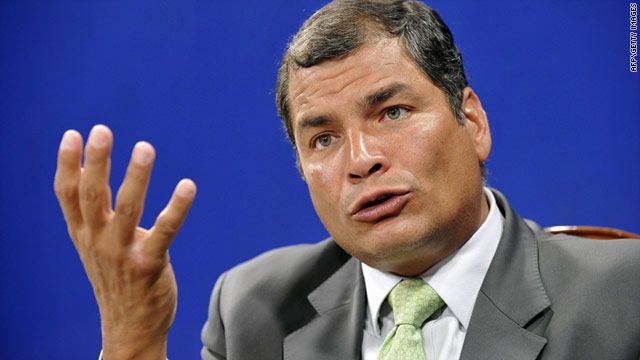 President Rafael Correa said Ecuador could not yet consider Mr. Snowden’s asylum request.
President Rafael Correa said Ecuador could not yet consider Mr. Snowden’s asylum request.
PORTOVIEJO, Ecuador - President Rafael Correa said Sunday that while there were weighty arguments for granting asylum to the fugitive American intelligence leaker Edward J. Snowden, it was up to Russia to decide what happens to him.
But with Russian officials maintaining that Mr. Snowden is not their problem, the president’s remarks added to a growing sense that Mr. Snowden is stuck in geopolitical limbo in a Moscow airport, where he has apparently been since he flew there from Hong Kong on June 23.
Mr. Snowden, who is wanted in the United States on charges of breaking espionage laws, has applied for asylum in Ecuador, but Mr. Correa said that his government could not begin to consider the request until Mr. Snowden reached Ecuador or one of its embassies. Mr. Snowden’s American passport has been revoked; without it, he would appear to be unable either to pass through Russian immigration control or to travel on to another country.
“He’s in the international area of the Moscow airport, but basically under the care of the Russian authorities,” Mr. Correa said in an interview. “Strictly speaking, the case is not in our hands.”
Russian leaders disclaim responsibility as well, noting that the transit zone of Sheremetyevo airport in Moscow, where Mr. Snowden is believed to be cloistered, is legally considered to be outside Russia’s borders.
A Russian immigration official, speaking on the condition of anonymity, said that Mr. Snowden had not applied for a visa, which would be needed to leave the transit zone, and that he could remain there indefinitely if he wanted. There have been cases of asylum-seekers living in the transit zone for as long as nine months.
Dmitri S. Peskov, the press secretary to President Vladimir V. Putin of Russia, said in a radio broadcast on Sunday that Mr. Snowden’s situation “is not one on the Kremlin’s agenda.” Mr. Peskov said in a separate interview that Mr. Snowden had not applied for asylum in Russia.
Mr. Correa said his ambassador to Moscow had met with Mr. Snowden on his second day at the airport, and that he had instructed the ambassador to see Mr. Snowden again, to tell him why Ecuador could not yet consider his application.
Mr. Correa provided some new details about how Mr. Snowden’s truncated dash for refuge unfolded. He said that the country’s foreign minister, Ricardo Patiño, probably discussed the possibility of asylum for Mr. Snowden when he met in London with Julian Assange, the founder of the antisecrecy organization WikiLeaks, several days before Mr. Snowden left Hong Kong.
Mr. Assange has been living in the Ecuadorean Embassy in London for more than a year, after taking refuge there to avoid being extradited to Sweden, where he is wanted for questioning in a sexual assault case. He was not involved in the release of classified documents by Mr. Snowden, but his group has been counseling Mr. Snowden since then.
Mr. Correa said he learned of Mr. Snowden’s request on June 23, the day Mr. Snowden flew to Moscow, and that the request was not a surprise, because Mr. Assange had let Ecuadorean officials know that it was likely.
Mr. Correa indicated that the asylum request would get sympathetic consideration if Mr. Snowden was able to get to Ecuador or to an embassy.
“Perhaps he broke the law of the United States, but in order to tell the truth to the United States, the American people and the entire world, and it’s a very urgent truth,” Mr. Correa said. “I think that this is a weighty argument in deciding whether or not to give him asylum.”
On Sunday, Mr. Assange said in an interview on the ABC program “This Week” that more secrets would surface from the material taken by Mr. Snowden.
“Look, there is no stopping the publishing process at this stage,” Mr. Assange said, speaking from London. “Great care has been taken to make sure that Mr. Snowden can’t be pressured by any state to stop the publication process.”
Mr. Assange seemed to suggest that by canceling Mr. Snowden’s passport and leaving him “for the moment marooned in Russia,” the United States had played into the Russian spy services’ hands, giving them the opportunity to examine the hard drives on the four laptop computers that Mr. Snowden is believed to be carrying. “Is that really a great outcome by the State Department?” Mr. Assange said.
As for Mr. Assange’s refuge in the Ecuadorean Embassy, Mr. Correa said: “He will always be welcome. If this isn’t resolved and he wants to spend 50 years in the embassy, for us there is no problem. He’s under the protection of Ecuador.”
 В Атырау -10
В Атырау -10